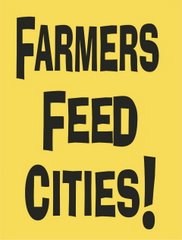Joe Urban Dweller loves to eat and play, paying for all of that by working.
Now, a Northumberland woman is helping demonstrate how the agriculture industry impacts what Joe Urban Dweller - and everyone else - does in daily life.
Farmers Feed Cities '07 is aiming to tell the urban dweller what is happening in the fields he passes as he heads out on a road trip to work or play, Laura Kapteyn says.
"Farmers are feeding lifestyle, they're feeding the economy. They're fueling cities and they're improving the environment," Ms. Kapteyn says. She's a human resources management graduate with a Bachelor of Commerce degree. Now. she's a marketing and communications assistant on the two-year-old Farmers Feed Cities (FFC) campaign.
She's helping to write material for the FFC road trip summer campaign, a series of 60-second spot-news blurbs to help people understand the the fields as the summer progresses: "It's showing people how the regular things they do in their day-to-day life are connected to agriculture."
Farming affects the playground of the urban community, Ms. Kapteyn says.
"Farmers have that deep commitment to the earth, the places where we play, those big open spaces that people enjoy, the farmer has a stake in those big open spaces," adds Lisa McLean, the communications manager of the grains and oilseeds sector's Farmers Feed Cities campaign.
"One in seven jobs is connected to agriculture," she notes. And, "there is a lot of industry that depends on agriculture. Eating (all aspects of the food industry) is the obvious one.
"Farmers are stewards of the land," promoting greener technologies which improve the breathing environment for society, Ms. McLean points out. "We're going to be explaining that over the summer."
That explanation will also offer a free game card, downloaded from the FFC website, for people to play when they're heading down the road.
People can win prizes by participating.
Ms. Kapteyn will also be organizing displays, dispensing materials and ensuring FFC is an ongoing presence at the many venues it visits in the year, including Northumberland's August Rural Ramble and the Royal Winter Fair in
"I've always been passionate about educating people about agriculture," Ms. Kapteyn, the daughter of (former) dairy farmers Pete and Ingrid Kapteyn of Colborne, says.
"The slogan provokes conversation. 'Farmers Feed Cities' gets people talking, " she says.
The program's sound bites address planting, harvesting and environmental practices taking place roadside "in quick little news bites" available Thursdays at noon and ready for broadcast on Friday, Ms. McLean says.
"CTV told us they'd love to cover more agriculture, but they want something quick they can read on the air."
The campaign is committed to providing interesting, informative and succinct news bites about "why and how farmers do what they do" . It promises, "Our 60- second news spots will be waiting in your inbox by 11 a.m. every Thursday from May 24 through Sept 13."

